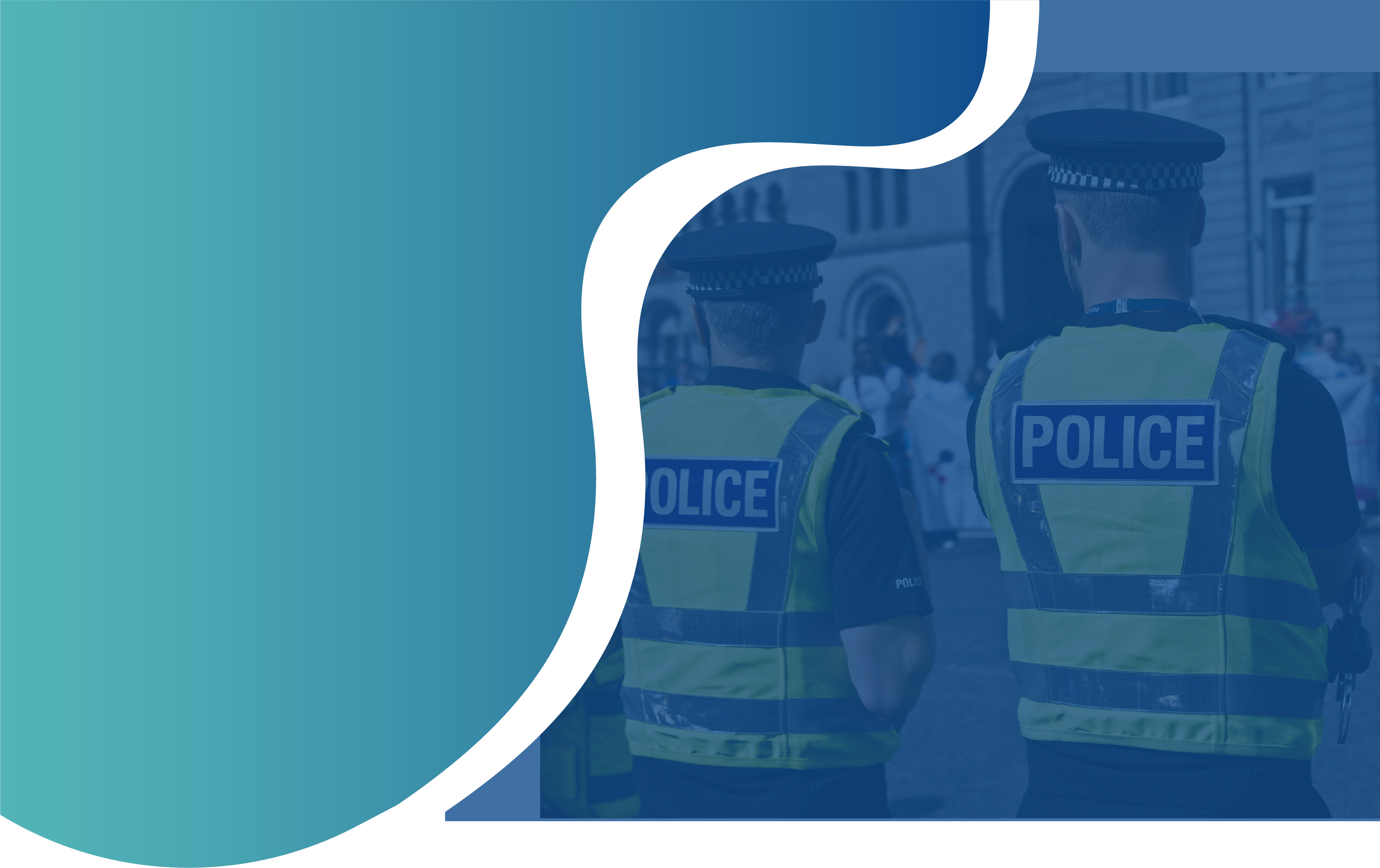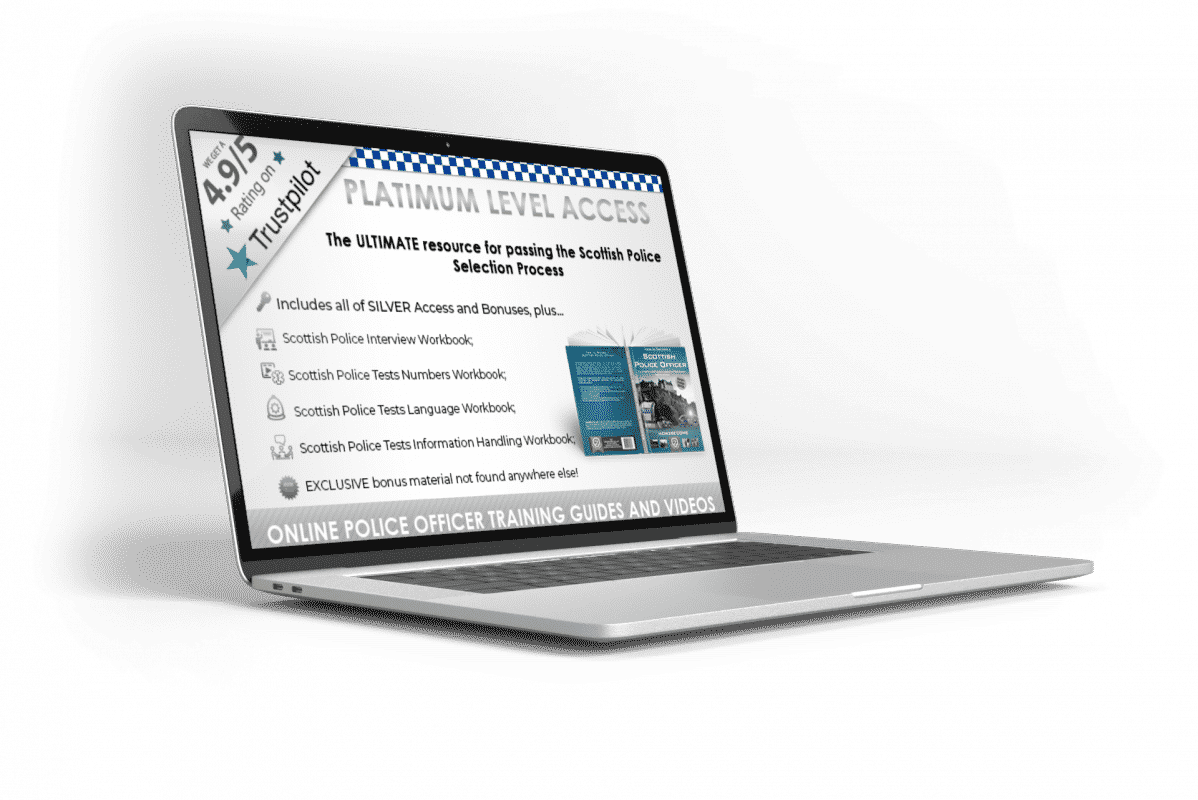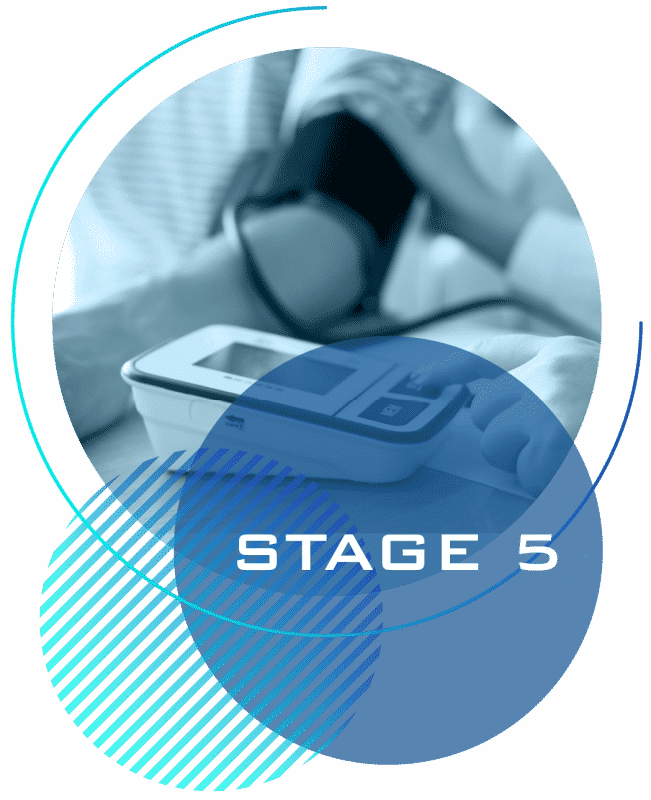
The complete guide to unlocking and passing the Scottish police recruitment process.
![]()
4.9/5 Rating | 1,000+ Reviews

The complete guide to unlocking and passing the Scottish police recruitment process.
![]()
“…If you can answer the questions in these guides then there is no doubt that you will pass, I did!” – Naomi C. TrustPilot

Training That Works
Discover a masterclass of Scottish police recruitment knowledge and insider secrets from How2Become
Unlock Your Potential
Whether you’re just starting out or you’re reapplying, you will get access to on-demand training that will catapult your career
Get instant access to the on-demand police recruitment training guides, interactive online tests, and video modules – suitable for all Scottish Police Forces








With the help of industry experts, we have put together the most comprehensive online resource to passing the Scottish police selection process available. From initial application to online tests, assessment centre to interview, we’ve covered every single base in this online resource. If you want to become a Scottish Police Officer, there’s no better resource.
Let’s start off by telling you what the Scottish selection process involves and how we can help you join the Scottish police!
We have collated a mass of insider information on how to successfully pass the selection process and it is all available on this page.


The selection process to join the Scottish police will normally consist of the following elements:
Online Application Form
The Scottish Police Entrance Test (PSET)
Fitness Test
Assessment Centre & Interview
15. Medical Check Up Medical Assessment & Vetting

The application form is the first stage of selection. You will normally be required to complete the form online and it should be your priority to ensure that you match the assessable competencies and values that are relevant to the role.
Once you have successfully passed the application form you will be invited to take part in the Entrance Test. During which you will be required to answer questions based on the following categories:
PSET: Language
PSET: Numbers
PSET: Information Handling
The language element of the PSET will test you on areas such as grammar, spelling, punctuation, understanding of sentence structure, and tenses.
The numbers part of the test focuses on your ability to answer a range of different numerical problems, you are not permitted to use a calculator.
Information Handling will test your ability to interpret information presented to you in a number of different formats. The test on the day will last for 60 minutes and you will have to answer 57 question across the three subject matters.


Police Scotland expects its officers to maintain a high level of fitness. To have any chance of success you will have to prove this to progress. You will have to complete a multi-stage shuttle run to level 5.4, or complete a 1.5 mile run in under 18 minutes. You will also be assessed on your overall fitness levels, recovery period and your weekly exercise routines.
During the assessment centre, you will have to take part in a number of exercises to further test your suitability for the role of police officer with Police Scotland. These will include an icebreaker exercise, group exercise, and a formal interview.


The final stages of selection involve a medical, this will include an eyesight and BMI test. You may also be required to take a substance misuse test. Your references will be contacted and if you pass the final stage of vetting, all that will be left is to receive for your formal offer of employment as a Scottish Police Officer.

Do you want to become a SCOTTISH police officer?
Get the edge now from only £15.00. Today’s price only £12.97!

Watch the video to find out how this resource will help you.
To be able to join Police Scotland as a police officer you will need to first be eligible to join. For example, to be appointed you will need to be over 18, but you can apply from the age of Seventeen and a half years old, but would not be able to start if successful until you are 18 at the earliest. There are also a number of fitness and medical standards which you will need to be able to pass to be eligible. Your BMI should be between 18 and 30, although this will not be assessed until the end of the process, you should have yours checked prior to your application to avoid disappointment of failing this part of the medical. Your eyesight must also must also meet the minimum national standard, like the BMI test this is not assessed until the end, so before applying get your eyesight checked to ensure yours meets the standard.
Police Scotland will only accept applications from British and EU citizens or Commonwealth citizens. Some foreign nationals can apply, but they must have indefinite leave to remain in the UK. If these conditions are met you will be eligible to apply and start your application by completing an online application, Standard Entrance tests, Interview and interactive exercises.
As mentioned in the previous question, as long as you are 17.5 years old you can apply to be a police constable with Police Scotland, but you would not be able to start until you reach 18 years old. There is no upper age limit for applying to join Police Scotland as a police officer.
When you commence your service, you would start on a salary of £26,037, rising to £28,000 + after the first year of service. Upon completion of the second year, the salary will increase to over £30,000 per annum. This will continue to increase each year up to a cap at 11 years to over £42,000 per annum. If you achieve promotion at any stage this would also include further salary increments.
You do not require any formal qualifications to apply to join Police Scotland as a police officer. However, you would be expected to demonstrate the Competency and Values Framework at all times during the selection process. This in itself will require much preparation and work that you align yourself to these core values and skills.
The role will definitely involve shifts, roughly 40 hours per week. As a police officer role is a around the clock support role, you would be expected to work days, nights, weekends and bank holidays, including Christmas and the new year celebrations.
Police Scotland: The Selection Process
With so few places available, competition for a job with Police Scotland is incredibly fierce. Naturally, the police are highly selective about who they allow into the service, and for this reason the selection process itself is very tough to pass. Only the most elite of candidates will be able to pass all of the tests, and make it through to employment.
When applying to become a Scottish Police Officer, you’ll need to complete the following tests:
If you think this sounds tough, then you are right! Luckily, our guide covers each of the above areas in great detail.
Following the submission of your application form, provided you are successful, you’ll be invited to take part in what is known as the Entrance Test (PSET). You’ll take the PSET via an online assessment centre. You will be required to answer 57 questions in 60 minutes.
The PSET is an examination, which tests you on the following areas:
• Language;
• Numbers;
• Information Handling.
Now, let’s look at each of these sections in a bit more detail.
PSET Language
The language element of the PSET will test you on areas such as grammar, spelling, punctuation, understanding of sentence structure, and tenses.
There are four different types of questions you will be tested on in the language part of the PSET.
Grammar: These are fairly simple grammar-based questions. It will contain questions based on spelling, tenses, verbs, conjunctions, prepositions, pronouns, comparatives and superlatives, and vocabulary.
Missing Words: This will test your reading comprehension ability and understanding of grammar. You’ll be provided with a passage,
and then be required to pick 12 words out of a total of 17, to fill in gaps in the passage.
Mixed Up Sentences: These questions are pretty tricky. You’ll be given four jumbled-up sentences and will need to work out the correct order of the words. These sentences are deliberately difficult, and therefore it’s important to stay calm and focused, and don’t panic if you find them confusing initially.
Reading Comprehension: This is a direct test of your reading comprehension. You will be presented with a number of passages, with questions following each passage. The questions will be based on what you’ve read. So, you need to pay close attention to all of the facts contained in the passage, and answer based on this.
PSET Numbers
As part of the PSET you will have to answer mathematical questions. This is possibly the area where the highest number of candidates fall down. If you aren’t familiar with the mathematical concepts that are assessed or haven’t practiced, then you will really struggle with this part of the test. With this in mind, you need to revise thoroughly beforehand. You will not be allowed to use a calculator for this assessment, and there are 20 questions in total.
The structure of the numbers questions are as follows:
When taking this paper, a basic thing to remember is to always include symbols in your answers. For example, if the question asks you to add together two amounts of money, and you omit the £ sign from your answer then you will not get the mark. This is the same for factors such as %, am/pm and weight.
PSET Information Handling
The remaining subject of the PSET is the Information Handling assessment. Along with the numbers questions, these are also questions candidates tend to find the most tricky, and many people will fall down when it comes to this.
There are lots of reasons for why these questions are so hard. Foremost among these, is that the style of test is something that most people won’t be used to. You’ll be given lots of tables and charts, and will need to answer questions based on the information within these. Fear not though. While the test is really difficult, you can practice for it, and that’s where we are here to help!
The information handling questions run on a six-monthly rotation. This means that every 6 months, Police Scotland swap the questions for new ones. They have a number of questions in rotation at the moment, with all of the these differing in difficulty and style. This is deliberate. Although Police Scotland want you to prepare, they also want to see how well you can deal with unexpected information.
There are two different types of question in this subject, observation questions and calculation questions. Typical observation questions will look like this:
Typical calculation questions will look like this:


We guarantee that our How To Become a Scottish Police Officer online resources will teach you how to navigate the different elements of the selection process. The package contains 160+ pages of police recruitment information, tests which will guide you through each of the different elements of selection, including the application form, the assessment centre, the interviews and the fitness test.
Please note this is a subscription service. Please see full details below.


We guarantee that our How To Become a Scottish Police Officer online resources will teach you how to join Police Scotland and navigate the different elements of the selection process successfully. The package contains 160+ pages of police recruitment information, tests, and top tips which will guide you through each of the different elements of selection, including the application form, the online tests, assessment process, the interview, and the fitness tests.
If you pass the PSET and the fitness test/assessment, you’ll be invited to attend the assessment centre. Your assessment centre will consist of the following exercises:
Below we’ve laid out some information on these tasks:
During the assessment centre you will be asked to take 3 practical exercises. All of the exercises will be group-based tasks, which place an emphasis on teamwork and co-ordination, as well as your understanding of the competencies and values. Group activities may also range from the cerebral (using the group to think) to the physical (and this could be anything from the less strenuous building a tower from spaghetti, to the more testing issue of swinging from ropes). Group activities are usually included in an assessment centre to test how you perform within a group situation – how you decided on your place within the group and how you interact with others. Today it is accepted that mechanical skills and knowledge are not enough by themselves; they are only part of the story. Very few people work in isolation and the ability to work with others, motivate and tap into their idea streams are key. This is especially important in the police, where your ability to work with others could have a direct impact on issues such as crime rate, and the welfare of members of the public.
In essence, group activities are designed to test how you react in people-focused situations, and put you under some form of pressure. It is when we are under pressure that we see how short a person’s temper really is, or how they handle discord in the group. It’s very important that police officers can maintain a calm and composed outlook, and stay in control of their emotions.
The assessment centre interview will be competency-based. You will need to answer a series of questions, these questions will be focused around the Competencies and Values Framework (CVF). This consists of 4 values and 6 competencies contained within 3 clusters.
Values:
Clusters:
Competencies:
You will likely be asked at least one question based on each of the competencies and values. It also would not be unusual for the interviewers to ask one or two motivational style questions on top of this. When you answer these questions, you will need to use the STAR method.
Below we have provided you with a sample question and responses, from one of the above competencies!
Q. “Tell us about a time when you have used your communication skills to resolve a difficult problem.”
Explain what the result/outcome was. Try to make the result positive as a result of your actions.
Now explain what had to be done and how you overcame any obstacles or hurdles.
Explain how it was decided who would carry out what task.
Explain why the task was difficult and whether there were any time constraints.
Now explain who else was involved and what the task was.
Explain what the situation was and how you became involved.
Sample Response:
“In my previous role, I worked as a team leader at a catering company. The company have a great reputation, and are well-known nationally. Our company would organise the catering for parties and events. Different events were handled by different teams within the organisation. As one of the team leaders, my role was to oversee the management of any projects that my team was given. This included making sure that the budget was adhered to, motivating staff to perform at their best, and giving my team instructions on how we should allocate our resources. In order to help me manage the team, I had assigned a sub-team leader, named Michelle. Michelle would take responsibility for making key decisions.
We were preparing to host a birthday party in Wolverhampton. The event in question was a big birthday party. I sent my team to the venue to help start setting up, whilst I met with the person who was running the event, just to cross-check on key elements such as time, and dietary requirements. When I arrived at the venue, I found that two members of the team were engaged in a furious debate. One of them was Michelle. Voices were raised and things were getting extremely heated. This was attracting the attention of the venue staff, who looked extremely unimpressed by the situation.
I quickly stepped in, and asked Michelle and the other team member to calm down and asked them come outside with me, so that we could resolve this. I then calmly and professionally asked them to explain what the issue was. Michelle explained to me that the team member was refusing to obey her instructions. She had asked him to lay out a series of fish pasties across the table on the right-hand side, but he had refused. Upon hearing this, the team member furiously interrupted. He said that we shouldn’t be serving fish pasties, because some attendees would be allergic to fish. He referred to Michelle in extremely demeaning terms. Having spoken with the event manager, I was fully aware of all allergy requirements – and none of the attendees were allergic to fish.
After listening to both sides of the story, I first addressed the team member. I explained to him that the way he had spoken to Michelle was completely unacceptable, and that even if she had made a mistake, this would not be okay. I then explained to him that dietary requirements were discussed with the event manager and I can confirm that no attendees who were allergic to fish. To reassure the team member I showed him the event listing, which contained the details of all known allergies.
Once the team member saw this, he acknowledged that he had made a mistake, and apologised profusely to Michelle. Michelle immediately accepted his apology, and informed him that mistakes happen, and that the important thing is to move forward and resolve this. I was happy with this, and authorised the team member to continue preparing for the event.”
Now, let’s look at some sample competency questions. For the purpose of this page, we’ve provided you with 2 sample questions and a brief description of how to answer each one. Within our resources you will find many more questions just like these, plus full and in-depth responses!
Q1. Can you give me an example of a time when you have utilised your job knowledge, to resolve a difficult situation?
Job knowledge is a really important part of working as a Scottish police officer, and is one of the listed competencies and values. The better you understand the core requirements of your role, and how they fit into Police Scotland’s wider objectives, the better you will be able to act as an exemplary representative of the police service. Police Scotland don’t just want a candidate who goes through the motions with their job, they are looking for someone who is enthusiastic and committed, who has made a conscious effort to understand every single element of the role. When answering this question, think about the following:
Q2. Can you give me an example of a time when you have worked with a colleague to help improve their performance?
This question is asking you to demonstrate the competency of working collaboratively. It’s important that police officers can work constructively together, to achieve organisational goals. Part of being a good co-worker is helping your colleagues when possible, to improve their own methods, and become more valuable members of the police service. When answering this question, think about the following:
Now, let’s look at some sample motivational and values questions. For the purpose of this page, we’ve provided you with 2 sample questions and a brief description of how to answer each one. Within our resources you will find many more questions just like these, plus full and in-depth responses!
Q1. Tell us why you want to become a police officer.
This is an incredibly common opening question, and it would be a huge surprise if you weren’t asked this during your interview. The best response here, is to be honest! Think about the reasons why you want to become a Scottish police officer. What has motivated you to apply? What is it about the police service that inspires you? Take a look at the goals and aims of Police Scotland on their website, do you share these goals?
Q2. Tell me about yourself and what qualities you believe you have, that will be relevant to the role of a police officer.
This is another very common question. Remember, the purpose of this interview is to help Police Scotland find out more about who you are, and why you would be a great police officer. So, it’s not unusual for them to just ask you this outright!
Once again, your best response is to be honest in this situation. Think about what makes you a good fit for the role? What are your best qualities? How would they be of use to Police Scotland?
Pay attention here! It’s pretty easy to go off on a tangent and reel off a big list of qualities that actually have nothing to do with the police service. Remember, you need to keep it relevant, and link your qualities back to what the police are looking for.